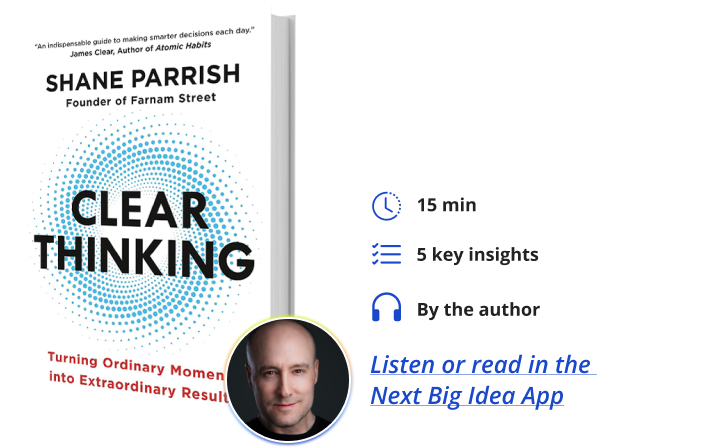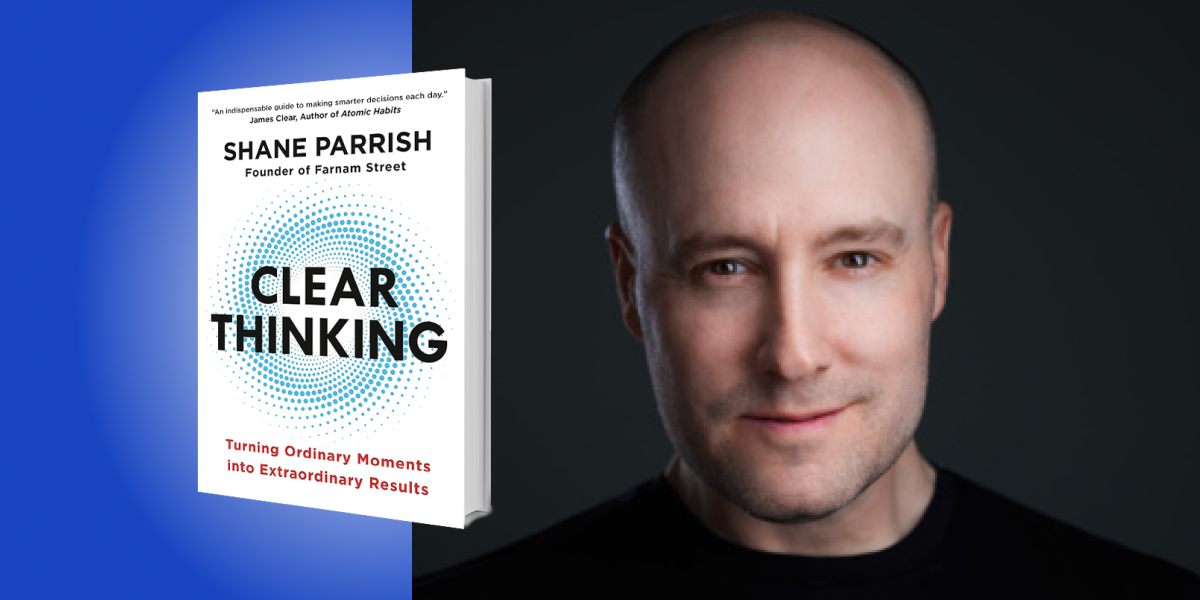Shane Parrish is the entrepreneur and wisdom seeker behind Farnam Street and the host of The Knowledge Project Podcast, where he focuses on turning timeless insights into action. Parrish’s popular online course, Decision by Design, has helped thousands of executives, leaders, and managers around the world learn the repeatable behaviors that improve results. His book Clear Thinking: Turning Ordinary Moments Into Extraordinary Results was an instant New York Times and Wall Street Journal bestseller.
Below, Shane shares five key insights from his new book, Clear Thinking: Turning Ordinary Moments into Extraordinary Outcomes. Listen to the audio version—read by Shane himself—in the Next Big Idea App.

1. Your position determines your future.
The greatest aid to judgment is starting from a good position. You don’t need to be smarter than others to outperform them if you can out-position them. Anyone looks like a genius when they’re in a good position, and even the smartest person looks like an idiot when they’re in a bad one.
We often think about the moment of decision and making the best decision, but we forget about what position we are in when the moment arises. My kids taught me this lesson when one of them flunked a test, handed it to me, and said, “I did my best.”
What he meant was he did his best from 10-11 when he sat down to write the test. What he didn’t understand is doing your best is often about the position you put yourself in. Putting yourself in a good position for the test means sleeping well, eating a healthy breakfast, and, of course, studying in the days leading up to the test. He hadn’t done any of that. By not doing the thing in his control, he put himself in a worse position. It’s like he chose to play life on hard mode.
We do the same thing: we put ourselves in poor positions when we don’t exercise, don’t sleep, don’t invest in our relationship with our partners, don’t prepare for the meeting, when we take out too big of a mortgage hoping things will stay the same, and countless other ways. Over the long term, the average person who constantly puts themselves in a good position beats the genius who finds themselves in a poor position.
What looks like talent is often good positioning. And the best way to put yourself in a good position is with good preparation. A good position allows you to think clearly rather than be forced by circumstances into a decision. One reason the best in the world make consistently good decisions is they rarely find themselves forced into a decision by circumstances.
2. Turn desired behavior into default behavior.
Eventually, everyone loses the battle with willpower. Sometimes, it’s really hard to do the things we want to do. We can use safeguards to change our behavior.
One type of safeguard is automatic rules. We’ve been taught our whole life to follow rules, but we’ve never been taught how to use rules to our advantage. Let’s say you want to lose weight and you’ve decided to skip desserts for a while. Every time you’re faced with a situation where you have to say no to dessert, you’re relying on willpower. Your friends will convince you it’s a celebration, to join them just this once, or you can start tomorrow. The social pressure is real. But there is a way around this. Your best self can create automatic rules for these situations before you face them. Your rule can be “I don’t eat dessert” and then when your friends say “Let’s have dessert,” all you have to say is, “I don’t eat dessert; it’s a rule,” and they’ll suddenly apply a lot less pressure to you.
“We’ve never been taught how to use rules to our advantage.”
You can also use rules to do more of the things you want to do. Let’s say you want to stay healthy, but going to the gym three to four times a week is a grind. One of the reasons it’s a grind is that you start to negotiate with yourself. That little voice in your head starts to say, “Hey, you’re pretty tired today, why don’t we skip the gym and we’ll do extra tomorrow?” You say, “Yeah, let’s do extra tomorrow.: But of course, tomorrow comes around and you don’t do extra. In fact that little voice is back saying, “You know you have a lot to do today, you’ll get more done if you skip the gym…”
And so it goes. The way around this negotiation with yourself is to work out every day. The conversation in your head goes from, “Should I work out today?” to “When and how do I fit this in?” I’ve shared this bit of wisdom with several friends who have used it to dramatically change their health. It’s a simple principle that creates a life-changing result.
Another way to change your behavior is by creating an intentional environment where your desired behavior becomes the default behavior. Joining groups whose default behaviors are your desired behavior is an effective way to create an intentional environment. If you want to read more, join a book club. If you want to run more, join a running club. Your chosen environment, rather than your willpower alone, will help nudge you toward the best choices.
3. If you do what everyone else does, you will get the same results everyone else gets.
Fear holds us back from taking risks and reaching our potential.
The social rewards for going with the crowd are felt long before the benefits of going against it are gained. One measure of a person is the degree to which they’ll do the right thing when it goes against popular belief. However, it is easy to overestimate our willingness to diverge from the crowd and underestimate our biological instinct to fit in.
No one grows up saying I want to do the same thing everyone else is doing. And yet, there is a comfort to surrounding yourself with people who agree with you or who are doing the same thing you’re doing. So, while there is sometimes embedded wisdom in the crowd, the social default’s big lie is mistaking the comfort of the collective for evidence that what you’re doing is going to lead to better results.
The only way to outperform if you’re doing undifferentiated work is to work harder than everyone else. Imagine a team of ditch diggers working with their hands. A slight variation in the amount of soil moved per hour is barely perceptible. Your work is indistinguishable from that of the person next to you. The only way to move more dirt is to dig for longer. Within this paradigm, the ditch digger who takes a week off to experiment and invent the shovel seems crazy. Not only do they look like a fool for taking a risk, but their cumulative production falls behind for every day they are not digging. Only when the shovel comes along do others see its advantage. Success requires shamelessness. So too, does failure.
Doing something different means you might underperform, but it also means you might change the game entirely.
4. Outcome over ego.
Our desire to feel right overpowers our desire to be right. The ego default urges us to feel right at the expense of being right. Few things feel better than being right—so much so that we will unconsciously rearrange the world into arbitrary hierarchies to maintain our beliefs and feel better about ourselves.
My first memory of doing so dates back to my days of working in a grocery store at age sixteen. One particular customer would always treat the staff poorly. He’d drive up in his fancy car, park it illegally outside, and run in to get something. When there was a line, he’d rudely comment and raise his voice, telling everyone to hurry up. We called him Mr. Rolex.
“We mistake how we want the world to work for how it does work.”
One day when he was waiting in my line, he told me, “Hurry the f**k up because this Rolex doesn’t pay for itself.” I’ll leave my reply out but let’s just say that it cost me a job.
It was worth it, though, because the experience made me realize that some people organize their unconscious hierarchy by money and status. Those were the ways Mr. Rolex had of keeping the score to always come out on top.
I remember walking home that night thinking that while I might not have a job, at least I wasn’t like him. At that moment, I rearranged the world in such a way that I, the newly unemployed high school student without a car or a lavish wristwatch, came out on top. I had unconsciously organized the world in a way where I could be above him and feel better about myself.
Both of us reverted to the ego default that day.
Most people go through life assuming that they’re right and that people who don’t see things their way are wrong. We mistake how we want the world to be with how it actually is. The subject doesn’t matter: we’re right about politics, other people, our memories, you name it. We mistake how we want the world to work for how it does work.
Of course, we can’t be right about everything all the time. Everyone makes mistakes or misremembers some things. But we still want to feel right all the time and ideally get other people to reinforce that feeling. Hence, we channel inordinate amounts of energy into proving to others—or ourselves—that we’re right. When this happens, we’re less concerned with outcomes and more concerned with protecting our egos.
The way to move this around is to switch your feelings to the outcome. I encapsulate this with the saying Outcome over ego. It’s a healthy reminder that you need to focus on the outcome and not how you feel.
5. It might not be your fault, but it’s your responsibility.
Self-accountability means taking responsibility for your abilities, your inabilities, and your actions. If you can’t do that, you might never move forward.
You might not have someone in your life who holds you accountable, but that doesn’t matter. You can hold yourself accountable. Others might not expect more from you, but you can expect more from yourself. No one else needs to reward or punish you into it.
“People who lack self-accountability tend to run on auto-pilot.”
External rewards are nice, but they’re optional; you don’t need them to do your best. Your honest judgments about yourself are more important than anyone else’s. When you screw up, you should be strong enough to look in the mirror and say, “This was my fault. I need to do better.”
While you may never have asked for it, you’re in charge of your own life—and a larger part of your outcomes than you may think. People who lack self-accountability tend to run on auto-pilot. This is the exact opposite of commanding your own life. These people constantly succumb to external pressure: seeking rewards, avoiding punishments, and measuring themselves against other people’s scoreboards. They’re followers, not leaders. They don’t take responsibility for their mistakes. Instead, they always try to blame other people, circumstances, or bad luck—nothing’s ever their fault.
Well, I have news for you. It’s all your fault.
There is always something you can do in the moment today to better your position tomorrow. You might not be able to solve the problem, but your next action will make the situation better or worse. There is always an action you can control, however tiny, that helps you achieve progress.
To listen to the audio version read by author Shane Parrish, download the Next Big Idea App today:































